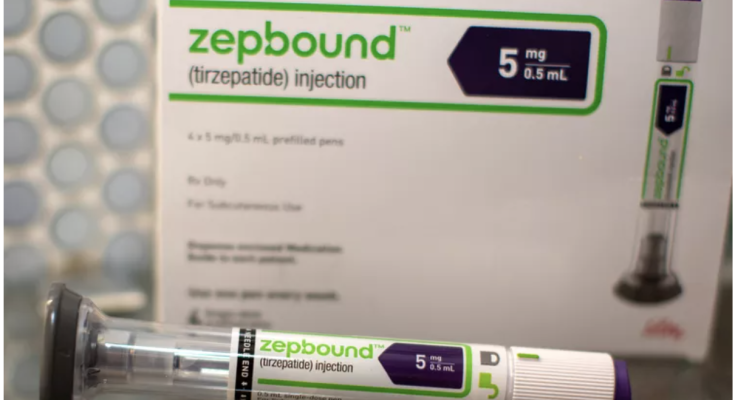The FDA suggests that prescribed users also reduce their calorie intake and increase their exercise
:max_bytes(150000):strip_icc():focal(802x468:804x470):format(webp)/Zepbound-injection-pen-tout-122424-51f996c35ed34a3082e8ce90804092bc.jpg)
The weight loss drug Zepbound, generically known as tirzepatide, is also now an approved medication to treat obstructive sleep apnea, per a Food and Drug Administration Dec. 20 press release.
The federal agency authorized the use of the Eli Lilly & Co. weight loss drug for “treatment of moderate to severe obstructive sleep apnea (OSA) in adults with obesity.” In addition to the GLP-1 prescription, the FDA suggests that users reduce their calorie intake and increase their exercise.
Sleep apnea “occurs when a person’s upper airway becomes blocked, causing pauses in breathing during sleep,” per the FDA.
“Today’s approval marks the first drug treatment option for certain patients with obstructive sleep apnea,” said Sally Seymour, M.D., director of the Division of Pulmonology, Allergy, and Critical Care in the FDA’s Center for Drug Evaluation and Research, per the press release. “This is a major step forward for patients with obstructive sleep apnea.”
:max_bytes(150000):strip_icc():focal(749x0:751x2):format(webp)/philips-sleep-apnea-machine-1-020224-0db04637f7594fd88110813b90a11114.jpg)
The FDA conducted two studies, both of which found that Zepbound helps reduce sleep apnea symptoms in some patients by aiding weight loss. Both studies monitored obese adults with moderate to severe sleep apnea over a 52-week period.
Unlike the participants who received the placebo, those who received the drug experienced a “statistically significant and clinically meaningful reduction” in episodes of shallow breathing or temporary pauses in breathing. This finding was found in both participants who used a CPAP (continuous positive airway pressure) machine and those who didn’t.
The American Academy of Sleep Medicine (AASM) also supports the FDA’s new authorization. However, the organization, which is “dedicated exclusively to the medical subspecialty of sleep medicine,” said Zepbound as a sleep apnea treatment is not an option for everyone.
“Although excess body weight is the major predisposing factor for sleep apnea, many cases of sleep apnea are related to other factors such as the structure of the jaw and upper airway,” AASM said in a Dec. 21 statement.
The AASM stated that Zepbound patients should note that continued weight loss is required for the prescription to be effective against sleep apnea symptoms.
:max_bytes(150000):strip_icc():focal(749x0:751x2):format(webp)/philips-sleep-apnea-machine-tout-1-020224-465750f6832944f28d11c454afd41ac1.jpg)
The approval of Zepbound follows a series of other weight loss drugs approved to treat medical conditions other than obesity and diabetes. In March, the weight loss drug Wegovy was FDA-approved to prevent strokes and heart attacks.
Along with the GLP-1 prescriptions treating heart disease, sleep apnea and obesity, there has been an increase in research on the possible treatment of addiction and certain cancers, per NPR.



